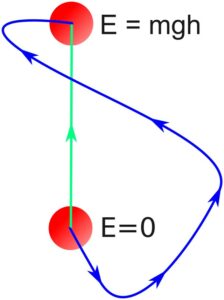In a rope, cable or string tension is created when we pull them from both ends in opposite direction. Here we are going to discuss the nature of tension force, is tension a conservative force or non-conservative?
Tension is a non conservative force but it is not dissipative in nature, which means there is no energy loss of energy. As it is a non conservative force tension force does not have any potential energy associate with it, similarly the work done by the tension is always zero.
Tension force
Tension is a contact force, and it transmits through the rope or cable, which we are using to pull or hold the object, also it is a self adjustable force it adjusts according to the need. When the limit of tension force is exceeds the rope gets break tension becomes zero. Tension force does not have any special formula to calculate its magnitude, so we use Newton’s second law to calculate the tension in a rope or cable.
Consider a mass M is hanging from roof by a inextensible string, to calculate the tension in a string we use the Newtons second law. The block is in stable condition, which means acceleration of block is zero. So the equation of the Newton’s second law will be,

Here T- tension in the string

This is the tension in the string due to mass M.

image credit:John Moore, CC BY-SA 3.0 https://creativecommons.org/licenses/by-sa/3.0, via Wikimedia Commons
Now let’s see what conservative and non conservative forces are,
Conservative force –
The force which are depends on the initial and final displacement of the object and not depend upon the path of motion is called conservative force, for example gravitational force, electrostatic force, etc. In conservative force work done is independent of path and similarly potential energy is associated with conservative forces. Total energy under conservative force remains constant.

Image credit: CompuChip at English Wikipedia, Public domain, via Wikimedia Commons
Non-conservative force –
Total energy is not remains constant under the influence of non-conservative force forces. In the non- conservative forces work done is depends upon the path by which motion occurs. Friction force, tension, force over a wooden block, these are some examples of the non conservative forces.
FAQ’s
Why non-conservative forces have no associated potential energy?
Potential energy is a stored energy that can be reusable at any time.
When a system do some work against a force that work gets stored in system in the form of change of shape, change of position or configuration. The non-conservative forces are path dependent quantities and not depend upon the initial and final condition of system, that’s the reason potential energy, is not associated with non-conservative forces
Why tension is not dissipative in nature?
Dissipative force means the force in which energy gets lost.
The non-conservative forces are dissipative in nature because working against this forces system’s energy gets lost, for example in friction force energy gets lost in the form of heat. Tension is exception to this because in there is no loss of any energy in the tension force.
Is conservative forces are path dependent or independent of path of a motion?
Mostly conservative functions are path independent, they depend on initial and final position of system.
The conservative forces are independent of path of a system. They are mostly depend on the initial and final position of a system.
Why the work done by tension is always zero?
The reason for zero work done is as follows,
Tension acts opposite to the direction of motion and as the direction of force and motion are opposite there is no actual displacement when we apply tension. Work done is the product of force applied on a system and the displacement of the system. As the displacement due to the tension is zero the work done by the tension is also zero.
Also Read:
- Gravitational force 2
- What increases the force of a magnetic field
- Internal forces examples
- Forces in static equilibrium
- Electrostatic force examples
- Is static electricity a contact force
- Is tension a contact force
- Natural frequency and forced vibrations
- Negative electrostatic force
- Force on moving charge in electric field
I am Shambhu Patil, a physics enthusiast. I have done M.Sc. in Physics. Physics always intrigues me and makes me think about, how this universe works. I have an interest in nuclear physics, quantum mechanics, and thermodynamics. I am very good at problem-solving and explaining complex physical phenomena in simple language. My articles will walk you through each and every concept in detail.